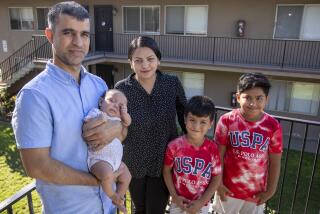Afghans Honor a Leader Who Fought Taliban
- Share via
KABUL, Afghanistan — A rally here Monday climaxed nationwide commemorations of the assassination a year ago of Ahmed Shah Masoud, the leader of the anti-Taliban resistance who was killed by suspected Al Qaeda operatives two days before the terrorist attacks on the United States.
Amid heavy security, streets in Kabul, the Afghan capital, were lined with portraits of Masoud. Police and soldiers donned T-shirts depicting his face as they ushered a crowd estimated at more than 10,000 people into the main stadium. Another 10,000 or so gathered to listen in adjacent fields.
Monday was declared a holiday, and electricity, shut off in the city during the daytime recently to conserve water at hydroelectric plants, remained on so that people could watch the four-hour memorial ceremony on television.
But although the ceremonies around the country and state-organized pilgrimages to Masoud’s mausoleum in the Panjshir Valley inspired in many a feeling of sadness, they also carried a strong overtone of propaganda benefiting Masoud’s Northern Alliance movement. The alliance controls some of the most powerful positions within the new Afghan state.
Masoud, an ethnic Tajik, is a hero to Tajiks, who made up most of the Northern Alliance forces. But he is not nearly so popular among other ethnic groups, who remember his role--along with those of other moujahedeen commanders--in largely destroying Kabul during a 1992-96 civil war.
No such criticisms of Masoud were heard at the rally in Kabul, where his 13-year-old son, Ahmed, rail-thin and dressed in a suit and the brown woolen cap favored by his father, stood under an enormous portrait of Masoud and received endless kisses from bearded dignitaries praising the man known as the “Lion of Panjshir.”
Reading a speech in a nervous voice, the young Masoud told the crowd: “This commemoration should be a renewal of our commitment to our martyred heroes. We should promise to follow their path and program, and pass it on to future generations, so that they too will defend their countries.”
The stadium where the rally was held was the same one where the Taliban regime once held public executions. A friend of Masoud’s who survived the bombing that killed him hobbled to the podium and delivered an emotional speech in praise of the slain commander.
As the day passed without terrorist incident, it appeared that the heavy security precautions were paying off. Authorities long have feared new attacks to coincide with this week’s anniversaries of Masoud’s death and the attacks Sept. 11 in the United States.
Afghanistan has been particularly on edge since Thursday, when President Hamid Karzai narrowly escaped a would-be assassin’s bullet in the southern city of Kandahar and a bomb went off in Kabul that killed at least 24 people.
On Monday, everyone entering the stadium was carefully searched for weapons. Cars were stopped and searched in the streets, and two helicopters circled above the crowd.
Masoud was killed by a bomb-packed video camera as he began an interview with two Arabs posing as journalists. Immediately after his killing, Taliban troops launched an all-out offensive to try to oust the Northern Alliance from the small corner of Afghan territory that it then controlled.
But U.S. intervention after the terrorist strikes in the United States changed the tide of that conflict, allowing Masoud’s forces to triumphantly enter Kabul by November.
Francesc Vendrell, the European Union’s special representative to Afghanistan, told reporters Sunday that he believed the attention being lavished upon Masoud was justified.
“I’m not surprised that Masoud has been turned into a hero. He was assassinated in a moment when there was a real danger that this country would be overrun by the Taliban,” Vendrell said. “His assassination was a tragedy and deprived Afghanistan of an important leader and a major partner to other potential leaders in this country.”
In addition to the rally in Kabul, ceremonies were held in several other cities, including Mazar-i-Sharif to the northwest.
Earlier, at a two-day symposium in Kabul, officials and scholars discussed the legacy of Masoud. In addition, special television programs were broadcast to commemorate his years of fighting against Soviet invaders and his later campaign against the Taliban, which his militia prevented from achieving a total takeover of the country.
A massive statue of Masoud, scheduled to be installed at one of Kabul’s main intersections, was not ready for the anniversary but will be unveiled in coming months, said Masoud’s younger brother, Ahmed Wali. He also said the former moujahedeen fighter was being nominated for the Nobel Peace Prize.
More to Read
Sign up for Essential California
The most important California stories and recommendations in your inbox every morning.
You may occasionally receive promotional content from the Los Angeles Times.













